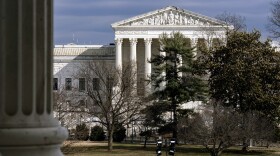HONOLULU — Hawaii has the lowest COVID-19 infection rate of any state in the nation. It's also a pandemic standout for a more dubious reason: instituting the most extreme restrictions on the public's access to official records.
In March 2020, Hawaii Gov. David Ige issued an emergency proclamation suspending the state's three-decades-old open records law, which aims to protect the public interest by exposing government to scrutiny.
The suspension came just as people were thirsty for information about what the government was doing to respond to the public health crisis, said Brian Black, executive director of the Civil Beat Law Center for the Public Interest.
"Not having a functional public records law leads to rumors and skepticism and a lack of confidence in government. And that's exactly what you don't want in an emergency," said Black, whose Hawaii non-profit organization promotes transparency and responsiveness in government.
Black said one example emerged when the state Department of Health in spring of 2020 said it had enough staff to track those infected with the virus with its more than 100 contact tracers.
A department employee told state senators this wasn't true when they made an unannounced visit to her office. The state health director resigned and the state epidemiologist went on leave a short time later.
"Without public records law and without the ability to double check the information that was being provided by the Department of Health, the only way that people could really make sure the department was held accountable ended up being a whistleblower who pointed out that the information was inaccurate," Black said.
Ige, a Democrat, said he understands why the open records law is important, but added that during the pandemic his administration asked employees to focus on keeping the community healthy and safe. In those circumstances, it's sometimes difficult to assign people to collect requested information, he said, especially when deadlines are involved.
"We've had many requests to our office and oftentimes the requests are very broad and open-ended — wanting to see all correspondence dealing with COVID-19, for example," Ige said. "And it does get to be a burden on staff to be able to collect all that information and decide which ones are appropriate or not and then respond to the request."
Ige said the open record law's suspension did not make a difference in the contact tracer controversy.
No one was specifically assigned with keeping track of how many contact tracers were available in each of the state's counties, and the state Department of Health could not provide Ige with a number when he asked. He said keeping track of the number of contact tracers was a priority that has since been corrected.
Black said the governor's suspension of the law "crossed a threshold" unparalleled by any other state during the pandemic.
Some lawmakers want to block such a thing from happening again. The state Senate this month passed legislation that would prohibit the governor or mayor from using emergencies to suspend public records requests.
Stirling Morita, a veteran journalist and the president of the Hawaii chapter of the Society of Professional Journalists, said there was no need for the governor to suspend the law because it already allows agencies to delay responses to requests.
Hawaii enacted an open records law in 1988 with text declaring: "Opening up the government processes to public scrutiny and participation is the only viable and reasonable method of protecting the public's interest."
Called the Uniform Information Practices Act, the law says government records are open to public inspection except in situations when disclosure would amount to an invasion of privacy — for example, when involving someone's medical records or eligibility for welfare assistance.
Ige's suspension of the law cited the need to enable state and county agencies to respond to the pandemic while implementing social distancing and other measures. In May, he eliminated the blanket suspension and instead removed deadlines for agencies to respond to record requests.
The same month, The Associated Press asked his office to provide copies of communications about the coronavirus that his staff exchanged with the state Department of Health, the tourism industry and other organizations.
His office declined, citing the emergency order and saying that the request would be addressed when employees "are able to work in their offices and normal government operations have resumed."
In December, Ige's office said it would grant the request, though the AP has yet to receive the correspondence.
The latest version of his emergency proclamation, adopted last month, suspends document response deadlines only if complying requires reviewing hard copy files that aren't accessible during the pandemic or if having staff reply to the deadline would impair an agency's pandemic response.
The initial order allowed agencies — even those whose work was not disrupted by the pandemic — to essentially say they would address requests when they wanted.
Black said the latest version narrows the criteria for which agencies can do so, which he called "a definite improvement."
He said he hopes the move marked a transition toward a more "normal" implementation of the law.




